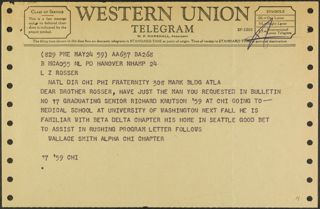From collection Member List

Luther Zeigler Rosser, affectionately known as “Judge,” was born in Atlanta, Georgia, on August 15, 1886. Rosser had extensive schooling, first attending the Georgia Institute of Technology. There was no Chi Phi chapter there yet, so he was given special dispensation to be initiated into Eta Chapter at the University of Georgia. He then helped establish Omega Chapter at the Georgia Institute of Technology and later attended Emory University, where he affiliated with Gamma Chapter.
A devoted Chi Phi, Rosser was involved in truly every aspect of Chi Phi Fraternity. He served as Grand Alpha from 1935–1939, Grand Epsilon from 1941–1943, Grand Eta and Executive Secretary from 1943–1946, and National Director from 1943–1959. In addition to Omega Chapter, Rosser helped found Theta Delta Chapter at the University of Florida and Alpha-Mu Chapter at Duke University. He was also a member of the Atlanta, Georgia Alumni Chapter.
In his professional life, Rosser was an attorney, appointed associate judge of the municipal court of Atlanta, and later promoted to chief judge, a position he held for many years. Rosser attracted national attention as a defense attorney in the trial of Leo Frank, a man accused of murdering 13-year-old Mary Phagan and later taken from prison and lynched by an angry mob.
Luther Rosser is remembered as a key figure in the growth and development of Chi Phi Fraternity during the 20th century. He died on August 13, 1971.
A devoted Chi Phi, Rosser was involved in truly every aspect of Chi Phi Fraternity. He served as Grand Alpha from 1935–1939, Grand Epsilon from 1941–1943, Grand Eta and Executive Secretary from 1943–1946, and National Director from 1943–1959. In addition to Omega Chapter, Rosser helped found Theta Delta Chapter at the University of Florida and Alpha-Mu Chapter at Duke University. He was also a member of the Atlanta, Georgia Alumni Chapter.
In his professional life, Rosser was an attorney, appointed associate judge of the municipal court of Atlanta, and later promoted to chief judge, a position he held for many years. Rosser attracted national attention as a defense attorney in the trial of Leo Frank, a man accused of murdering 13-year-old Mary Phagan and later taken from prison and lynched by an angry mob.
Luther Rosser is remembered as a key figure in the growth and development of Chi Phi Fraternity during the 20th century. He died on August 13, 1971.
Related Items

Wallace Smith to L.Z. Rosser Telegram, May 24, 1959
Wallace Smith writes to Luther Rosser, National Director of Chi Phi Fraternity, about Richard Knutson, a graduating senior who may be able to assist with recruitment at Beta Delta Chapter at the University of Washington. A response to this…
L.Z. Rosser to Brother Murphree Letter, October 21, 1944
Luther Rosser writes to Claude Murphree about the Theta Delta Chapter house and the end of World War II. This is a reply to a letter from Murphree dated October 17, 1944.
Bill to Judge Rosser Letter, March 5, 1953
William Butler writes to Luther Rosser to send his condolences for Mrs. Rosser, as well as about the closing of Alpha-Mu Chapter at Duke University. A response from Rosser is also part of the collection.
Grand Alpha Gavel, 1913-1941
This gavel features the names of Chi Phi Grand Alphas from 1913 until 1941.
L.Z. Rosser to Brother Linge Letter, May 19, 1955
Luther Rosser writes to Oystein Linge about his visit to the University of Connecticut in preparation for their charter presentation.
L.Z. Rosser to Brother Kramer, December 2, 1955
Luther Rosser writes to Walter Cramer about the report from Alpha Delta Chapter and a loan application for John Bevan.
Mildred Wells to Judge Rosser Card, January 1, 1951
Mildred Wells writes to Luther Rosser to thank Chi Phi Fraternity for the Christmas check they sent her.
L.Z. Rosser to Brother Smith Letter, May 26, 1959
Luther Rosser writes to Wallace Smith to inquire about Richard Knutson, a graduating senior from Chi Chapter, to determine his future plans and interest in Beta Delta Chapter at the University of Washington. This letter is written in respo…



